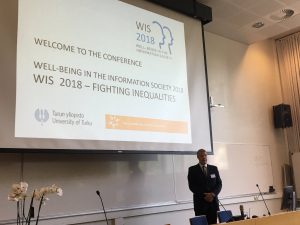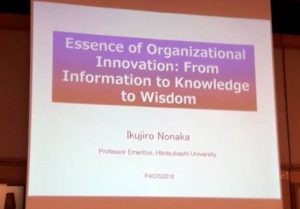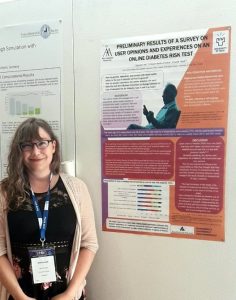This year the spring seminar of the National Society of Information Studies (Informaatiotutkimuksen yhdistys, ITY) was conducted in collaboration with the HIBA-project and with Information Studies, University of Oulu on 11th May at Oulu University. About 30 people participated the event and remote connection was also provided. The title of the seminar was Health information and eServices introducing multidisciplinary aspects on the topic.
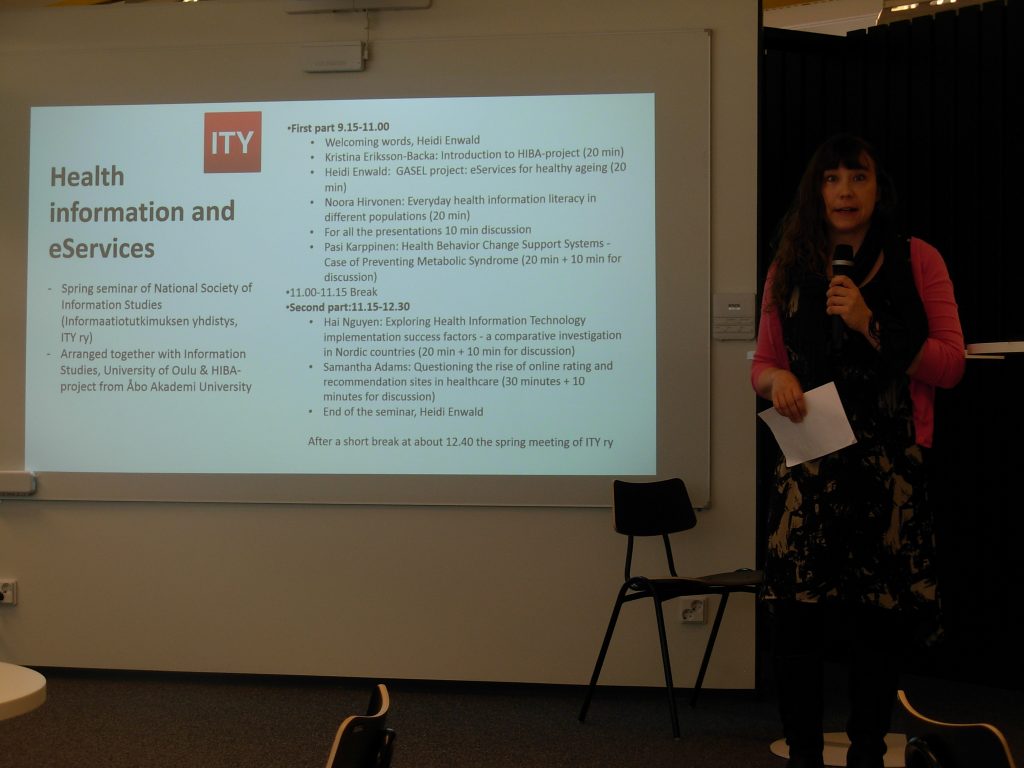
Chair of ITY Heidi Enwald presenting wellcoming words to the seminar
Senior lecturer Kristina Eriksson-Backa (Åbo Akademi University, Information Studies) presented the HIBA project, its research questions, methods and current stage of the research. The practical contribution of the HIBA project aims at understanding human information behavior to provide evidence-based recommendations how consumer health information technologies and their information contents could be designed and tailored to meet consumers’, in particular older adults’ (born 1946-1960), needs and preferences.
University lecturer Heidi Enwald (University of Oulu, Information Studies ) presented some findings of the recently ended multidisciplinary GASEL (Gamified services for elderly) project. The project was funded by National Technology and Innovation Agency TEKES from 1.1.201 to 30.4.2016. Increasing ageing population’s use of information technology related to health was studied with a population-based questionnaire survey. The questionnaire was posted to 1500 home dwelling people aged 65 or more living in Oulu area. The return rate was 61 percent. The findings indicated that 74,5 % of the respondents had Internet connection at home. The Internet was most frequently (65 %) used for multiple e-Services (e.g. bank, tax services, tickets etc.) and the second popular activity (55,5,%) was to find information for example about timetables, health related aspects etc. The next popular activities were reading news (49,8%) and using different communication channels (41,7%, e.g. e-mail, Skype etc.) Regarding to health information there were some gender differences, for example men were more likely to consider that health related stories and articles are too long.
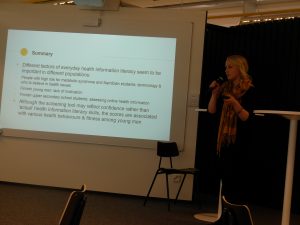
Noora Hirvonen
University lecturer Noora Hirvonen from Oulu University Information Studies spoke about studies of everyday health information literacy (EHIL) in different groups. Everyday health information literacy refers to competencies to find, to evaluate and to understand health-related information in everyday life situations. An EHIL screening tool (designed by Niemelä et al. 2012) is based on the Medical Library Association’s definition of health information literacy (2003). The EHIL tool is based on self-assessment and aims at identifying people with limited everyday health literacy. The EHIL tool has been piloted with a survey (n=217) in an upper secondary school in Finland in 2012 and further applied in a population of Finnish young men in 2012 and 2013 (n= 1870), with Finnish individuals with high risk for metabolic syndrome in 2013 and 2014 (n= 571) and with Namibian students (n= 271) with an English version of the tool. The comparison of the results indicates that different factors of EHIL seem to be important in different populations. Terminology and reliability of health information sources were important for people with high risk of metabolic syndrome and for Namibian students whereas lack of motivation was important with young Finnish men.
Pasi Karppinen (University of Oulu, Department of Information Processing Science) presented the eHealth service Onnikka which was designed for people with overweight or obesity (BMI 27-35) in a randomized lifestyle intervention study (PrevMetSyn). The study subjects were working-age males and females from the Northern Ostrobothnia Hospital District. The study groups A and B had eight (group A) or two (group B) group counselling visits and the study group C was a control group which used the Onnikka service with no counselling visits. The Onnikka service was designed according to the Persuasive Systems Design (PSD) model (see Oinas-Kukkonen & Harjumaa 2009) containing the elements of primary task support, dialogue support, credibility support and social support. 43 users of Onnikka were interviewed after one year about their user experiences. The results showed that for example self-monitoring, reminders and tunneling were perceived as a beneficial persuasive features among the users. The credibility of the service was perceived high (the institutions behind the service were well known and highly respected) but the need and use for social support was somewhat contradictory. The discussion forum was perceived useful, but it was not actively used by the participants.
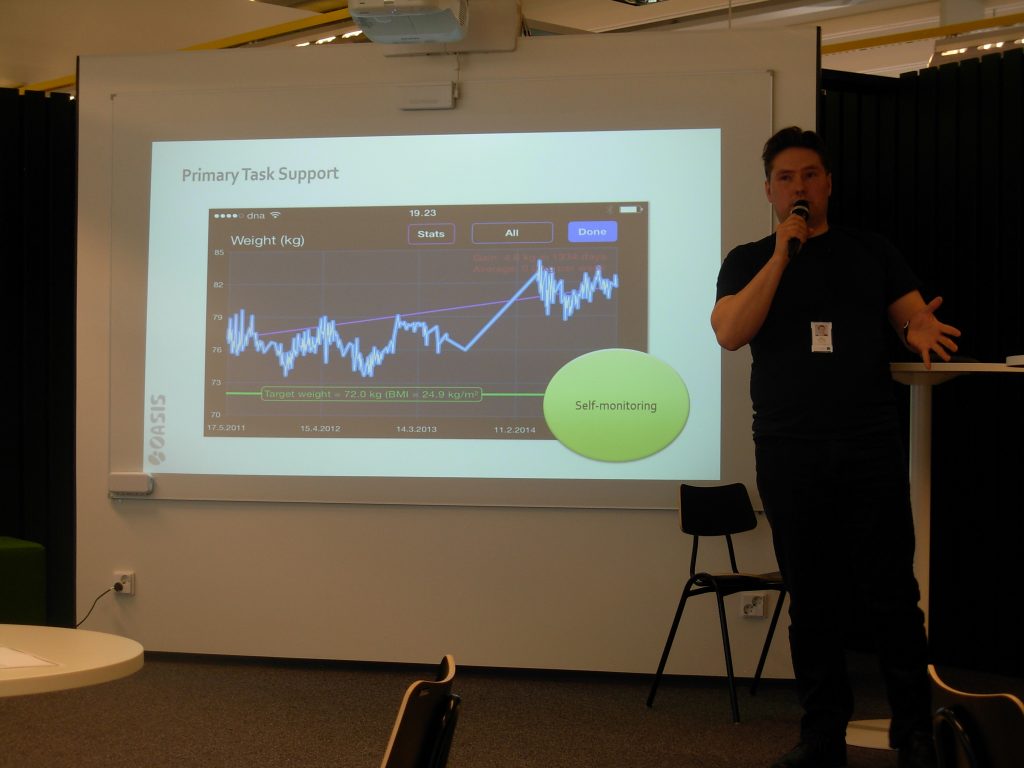
Pasi Karppinen
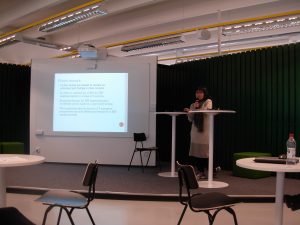
Hai Nguyen presentation
After the lunch break Hai Nguyen (HIBA researcher at Åbo Akademi University, Information Studies) presented findings from a study of Health Information Technology implementation and success factors in Nordic countries. Health Information Technology (HIT) systems store and retrieve information to support patient care activities, support administrative and financial activities (e.g. patient accounting, payroll, materials management etc.) and provide information and analytical tools to executive decision support systems for purposes of managerial decision-making. Success factors of implementing HIT systems were identified with a literature review and tested with a survey of 91 health care IT managers in the Nordic countries (Denmark 14, Finland 32, Norway 25 and Sweden 20). Some similarities in the Nordic comparison indicate that a more general instrument to define success factors for HIT implementation could be designed.
Associate professor Samantha Adams from Tilburg University Law School (Netherlands) spoke about online rating and recommendations sites in health care. This phenomenon is not yet familiar in Finland, but in USA and some European countries sharing opinions and experiences about hospitals and health clinics is in use. The basic idea is to improve quality of care and patient-centeredness by increasing transparency. However, the usefulness of the sites, ethical issues and true impact on the quality of care are not simple issues and need to be discussed further.
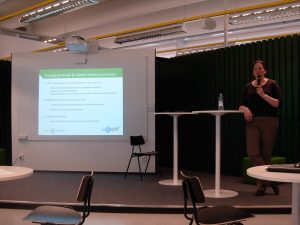
Samantha Adams, Tilburg Law school
The slides of the presentations will soon be available at the webpages of the National Society of Information Studies (Informaatiotutkimuksen yhdistys, ITY)
References
Niemelä, R., Ek, S., Eriksson-Backa, K. & Huotari, M.-L. (2012). A screening tool for assessing everyday health information literacy. Libri: International Journal of Libraries and Information Services 62(2): 125–134.
Oinas-Kukkonen, H & Harjumaa, M (2009) Persuasive Systems Design: Key Issues, Process Model, and System Features. Communications of the Association for Information Systems. 24(1): 485-500.

